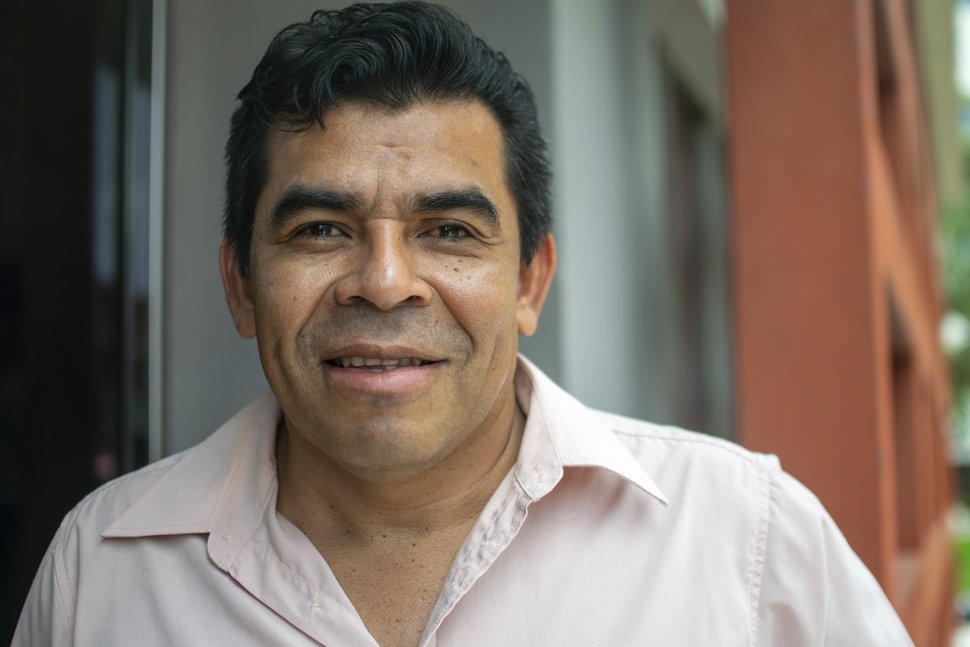Indigenous leader calls on Norway to respond to demands for carbon justice

Levi Sucre Romero is Coordinator of the Mesoamerican Alliance of People and Forests (AMPB). (Photo: AMPB)
We have been following the situation in Guyana where the ART forest carbon standard issued carbon credits to the government last December, and the Amerindian Peoples Association (APA) submitted a complaint and then an appeal to ART. The first conclusion of the APA appeal –
My main criticism of ART is that it does not address fundamental problems that arise with carbon markets, such as non-compliance with land rights, carbon ownership, and consultation under the principle of free prior and informed consent (FPIC), which is crucial for indigenous peoples. Our analysis of the ART certification process shows that ART does not adhere to international conventions such as the UN Declaration on the Rights of Indigenous Peoples. This was an achievement reached by many leaders resulting from a huge investment of time, resources, and energy so that the UN system would protect the rights of our peoples. Today, this sensitive issue for indigenous peoples and the very rescue of the planet from climate disaster are simply being ignored by ART.
Last fall, ART asked the Mesoamerican Alliance of Peoples and Forests to participate in a working group to give input into ART’s effort to create an additional mechanism that will put value on non-carbon benefits of standing forests. We declined. We did not see issues relating to rights being sufficiently addressed, and we viewed ART’s focus on “benefits” as a distraction.
Instead, we formed a working group with
The result of this work is a document, “Proposed additional layer on the rights of indigenous peoples and local communities within the ART TREES standard document,”
Until now, ART has been the only visible face in the discussions about this carbon standard. ART has refused to improve the guarantees for rights of indigenous peoples and local communities, despite this being repeatedly pointed out to them. It is time to ask: where are those who founded ART, those who finance it? This brings us directly to the Norwegian government. We have not heard the voice of the Norwegian government in our struggle for ART to respect the rights of indigenous peoples and local communities. For more than a year, we have heard the voices of APA in Guyana and the Mesoamerican alliance, with evidence and concrete proposals. It is time for those who finance ART to come out of anonymity, show their faces, and respond to the demands for justice and inclusion of our peoples.
Fifteen years after launching REDD+ [result-based payment system based on verified reductions in emissions from deforestation and forest degradation] in the world and waiting for countries to elaborate their national REDD+ strategies, efforts have largely been a failure. REDD+ was supposed to prepare the enabling conditions for a high-integrity carbon market that included agreements and mechanisms that would guarantee indigenous peoples’ rights. In the face of the failures of REDD+, certifiers (such as ART) are emerging in an attempt to “guarantee” the conditions that REDD+ did not manage to establish.
While this is the overall picture, Costa Rica is an exception and the case of Costa Rica’s application to ART for certification of forest carbon credits should therefore be analysed from another perspective.
For 10 years, the Costa Rican government and indigenous peoples have built the conditions for a carbon market based on the experience of Payments for Environmental Services, implemented in indigenous territories since 1997. During the last decade, Costa Rica has undertaken a consultative process regarding the REDD+ national strategy. A cultural mediators programme was created, and a territorialization process of the national results of the REDD+ consultation was carried out.
A Territorial Forestry Environmental Plan (PAFT) was created; a tool that applies national, international, and territorial safeguards in the carbon market. A Benefit Sharing Plan (BDP) was agreed upon, in which a dialogue mechanism by regional blocks with the government is maintained. At the national level, the General Mechanism for Indigenous Consultation was decreed. And the National Plan for the Recovery of Indigenous Territories (INDER-RIT PLAN) was established, which works on the legal regulation of lands, among other actions for the inclusion of women, youth, and the elderly.
Personally, I am afraid that because the ART certification process is so superficial, it could undermine all that has been achieved in Costa Rica by indigenous peoples and the government.
___________________________________
Levi Sucre Romero is a member of the Bribri indigenous people of Costa Rica and Coordinator of the Mesoamerican Alliance of Peoples and Forests, a network of 11 indigenous and community organisations in Mexico, Guatemala, Honduras, Nicaragua, Costa Rica, and Panama.
